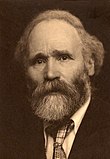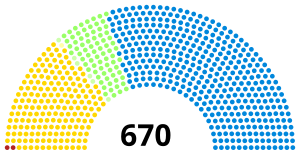
The Liberal Party was one of the two major political parties in the United Kingdom, along with the Conservative Party, in the 19th and early 20th centuries. Beginning as an alliance of Whigs, free trade–supporting Peelites, and reformist Radicals in the 1850s, by the end of the 19th century, it had formed four governments under William Gladstone. Despite being divided over the issue of Irish Home Rule, the party returned to government in 1905 and won a landslide victory in the 1906 general election.

Joseph Chamberlain was a British statesman who was first a radical Liberal, then a Liberal Unionist after opposing home rule for Ireland, and eventually served as a leading imperialist in coalition with the Conservatives. He split both major British parties in the course of his career. He was the father, by different marriages, of Nobel Peace Prize winner Austen Chamberlain and of Prime Minister Neville Chamberlain.
The Liberal Unionist Party was a British political party that was formed in 1886 by a faction that broke away from the Liberal Party. Led by Lord Hartington and Joseph Chamberlain, the party established a political alliance with the Conservative Party in opposition to Irish Home Rule. The two parties formed the ten-year-long coalition Unionist Government 1895–1905 but kept separate political funds and their own party organisations until a complete merger between the Liberal Unionist and the Conservative parties was agreed to in May 1912.
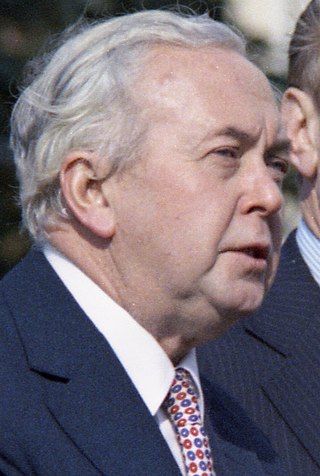
The October 1974 United Kingdom general election took place on Thursday 10 October 1974 to elect 635 members of the British House of Commons. It was the second general election held that year; the first year that two general elections were held in the same year since 1910; and the first time that two general elections were held less than a year apart from each other since the 1923 and 1924 elections, which took place 10 months apart. The election resulted in the Labour Party, led by Prime Minister Harold Wilson, winning a bare majority of three seats. That enabled the remainder of the Labour government to take place, but it saw a gradual loss of its majority.

The 1950 United Kingdom general election was the first ever to be held after a full term of Labour government. The election was held on Thursday 23 February 1950, and was the first held following the abolition of plural voting and university constituencies. The government's 1945 lead over the Conservative Party shrank dramatically, and Labour was returned to power but with an overall majority reduced from 146 to just 5. There was a 2.8% national swing towards the Conservatives, who gained 90 seats. Labour called another general election in 1951, which the Conservative Party won.

The 1951 United Kingdom general election was held twenty months after the 1950 general election, which the Labour Party had won with a slim majority of just five seats. The Labour government called a snap election for Thursday 25 October 1951 in the hope of increasing its parliamentary majority. However, despite winning the popular vote and achieving both the highest-ever total vote until it was surpassed by the Conservative Party in 1992 and again in 2019 and the highest percentage vote share, Labour won fewer seats than the Conservative Party. That was caused mainly by the collapse of the Liberal vote, which enabled the Conservatives to win seats by default. The election marked the return of Winston Churchill as Prime Minister and the beginning of Labour's 13-year spell in opposition. It was the third and final general election to be held during the reign of King George VI, as he died the following year on 6 February and was succeeded by his daughter, Elizabeth II. It was the last election in which the Conservatives did better in Scotland than in England.

The 1959 United Kingdom general election was held on Thursday, 8 October 1959. It marked a third consecutive victory for the ruling Conservative Party, now led by Prime Minister Harold Macmillan. For the second time in a row, the Conservatives increased their overall majority in Parliament, this time to a landslide majority of 100 seats, having gained 20 seats for a return of 365. The Labour Party, led by Hugh Gaitskell, lost 19 seats and returned 258. The Liberal Party, led by Jo Grimond, again returned only six MPs to the House of Commons, but managed to increase its overall share of the vote to 5.9%, compared to just 2.7% four years earlier.

The 1935 United Kingdom general election was held on Thursday 14 November, and resulted in a large, albeit reduced, majority for the National Government now led by Stanley Baldwin of the Conservative Party. The greatest number of members, as before, were Conservatives, while the National Liberal vote held steady. The much smaller National Labour vote also held steady but the resurgence in the main Labour vote caused over a third of their MPs, including National Labour leader Ramsay MacDonald, to lose their seats. It was the last election in which a party or alliance won a majority of the votes cast.

The 1929 United Kingdom general election was held on Thursday, 30 May 1929 and resulted in a hung parliament. Ramsay MacDonald's Labour Party won the most seats in the House of Commons for the first time despite receiving fewer votes than the Conservative Party, led by Prime Minister Stanley Baldwin. The Liberal Party led again by former Prime Minister David Lloyd George regained some ground lost in the 1924 general election and held the balance of power. Parliament was dissolved on 10 May.

The 1924 United Kingdom general election was held on Wednesday 29 October 1924, as a result of the defeat of the Labour minority government, led by Prime Minister Ramsay MacDonald, in the House of Commons on a motion of no confidence. It was the third general election to be held in less than two years. Parliament was dissolved on 9 October.

The 1923 United Kingdom general election was held on Thursday 6 December 1923. The Conservatives, led by Prime Minister Stanley Baldwin, won the most seats, but Labour, led by Ramsay MacDonald, and H. H. Asquith's reunited Liberal Party gained enough seats to produce a hung parliament. It is the most recent UK general election in which a third party won over 100 seats. The Liberals' percentage of the vote, 29.7%, has not been exceeded by a third party at any general election since.

The 1922 United Kingdom general election was held on Wednesday 15 November 1922. It was won by the Conservative Party, led by Prime Minister Andrew Bonar Law, which gained an overall majority over the Labour Party, led by J. R. Clynes, and a divided Liberal Party.

The 1918 United Kingdom general election was called immediately after the Armistice with Germany which ended the First World War, and was held on Saturday, 14 December 1918. The governing coalition, under Prime Minister David Lloyd George, sent letters of endorsement to candidates who supported the coalition government. These were nicknamed "Coalition Coupons", and led to the election being known as the "coupon election". The result was a massive landslide in favour of the coalition, comprising primarily the Conservatives and Coalition Liberals, with massive losses for Liberals who were not endorsed. Nearly all the Liberal MPs without coupons were defeated, including party leader H. H. Asquith.
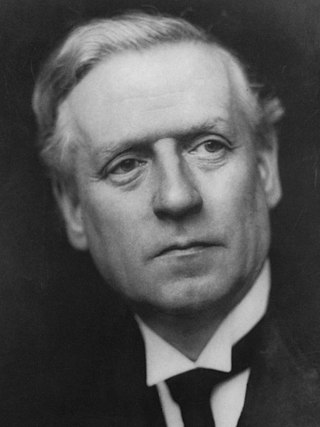
The December 1910 United Kingdom general election was held from 3 to 19 December. It was the last general election to be held over several days and the last to be held before the First World War.

The January 1910 United Kingdom general election was held from 15 January to 10 February 1910. The government called the election in the midst of a constitutional crisis caused by the rejection of the People's Budget by the Conservative-dominated House of Lords, in order to get a mandate to pass the budget.
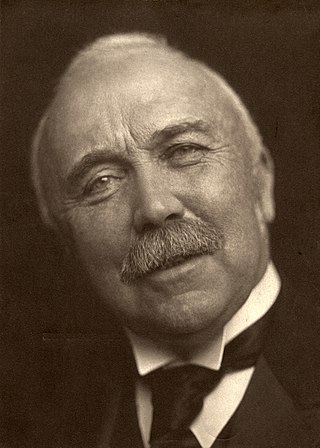
The 1906 United Kingdom general election was held from 12 January to 8 February 1906.

The 1895 United Kingdom general election was held from 13 July to 7 August 1895.

The 1892 United Kingdom general election was held from 4 to 26 July 1892. It saw the Conservatives, led by Lord Salisbury again win the greatest number of seats, but no longer a majority as William Ewart Gladstone's Liberals won 80 more seats than in the 1886 general election. The Liberal Unionists who had previously supported the Conservative government saw their vote and seat numbers go down.

The 1886 United Kingdom general election took place from 1 to 27 July 1886, following the defeat of the Government of Ireland Bill 1886. It resulted in a major reversal of the results of the 1885 election as the Conservatives, led by Lord Salisbury, were joined in an electoral pact with the breakaway Unionist wing of the Liberals led by Lord Hartington and Joseph Chamberlain. The new Liberal Unionist party elected 77 members and gave the Conservatives their parliamentary majority, but did not join them in a formal coalition.
The 1899 Edinburgh South by-election was a parliamentary by-election held for the House of Commons constituency of Edinburgh South in Scotland on 19 June 1899.




